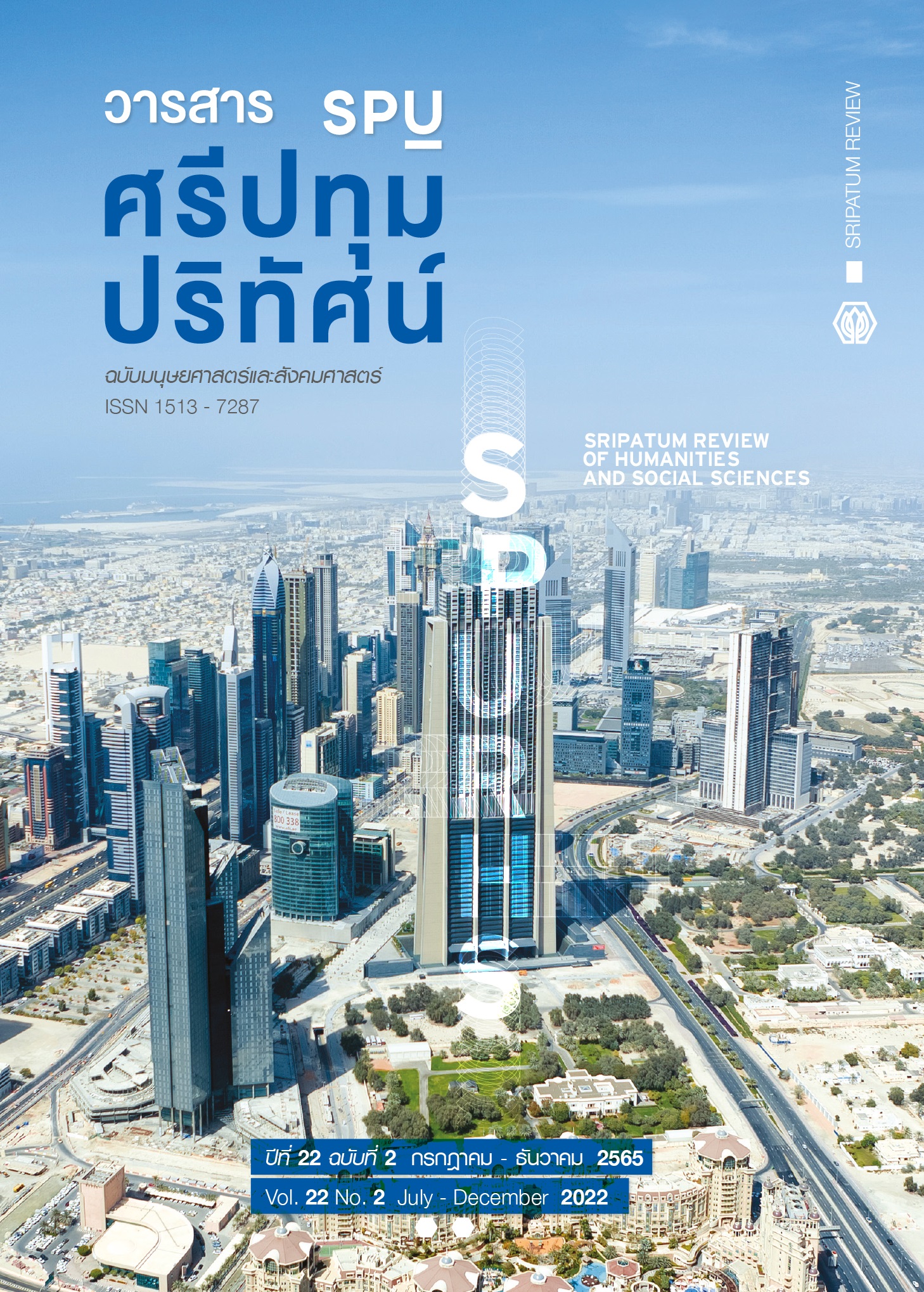ทฤษฎีอิทธิพลไทรอาดิก : โมเดลความสัมพันธ์ของปัจจัยที่ส่งผลต่อการดื่มแอลกอฮอล์ ของพนักงานในอุตสาหกรรมยานยนต์และชิ้นส่วนในประเทศไทย (Triadic Influence Theory: The Influencing Factor Correlation Model of Boozers in The Automobile and Parts Industry in Thailand)
Main Article Content
บทคัดย่อ
งานวิจัยนี้มีวัตถุประสงค์ 2 ข้อ คือ (1) เพื่อทดสอบความสัมพันธ์ระหว่างปัจจัยจากภายในตัวบุคคล ปัจจัยจากบริบททางสังคม และปัจจัยจากสิ่งแวดล้อมทางวัฒนธรรมในการดื่มเครื่องดื่มแอลกอฮอล์ และ
(2) เพื่อพัฒนาและตรวจสอบความสอดคล้องของโมเดลสมการโครงสร้างไทรอาดิกกับข้อมูลเชิงประจักษ์ ผู้วิจัยเก็บข้อมูลโดยใช้แบบสอบถามจากพนักงานบริษัทที่ดื่มแอลกอฮอล์ของกลุ่มอุตสาหกรรมยานยนต์และชิ้นส่วน จำนวน 786 ราย และทำการวิเคราะห์ข้อมูลโดยใช้โมเดลสมการโครงสร้าง ผลการวิจัยพบว่า
(1) ปัจจัยจากภายในตัวบุคคล ปัจจัยจากบริบททางสังคม และปัจจัยจากสิ่งแวดล้อมทางวัฒนธรรม เป็นปัจจัยที่มีผลต่อพฤติกรรมการบริโภคเครื่องดื่มแอลกอฮอล์และมีความสัมพันธ์กันในทางบวก และ (2) โมเดลสมการโครงสร้างไทรอาดิกมีความสอดคล้องกับข้อมูลเชิงประจักษ์ โดยค่าสถิติจากการวิเคราะห์ผ่านตามเกณฑ์ที่กำหนด ผลการวิจัยนี้ระบุถึงที่มาของการดื่มแอลกอฮอล์ของพนักงาน ซึ่งสามารถนำไปปรับใช้ในการวางแผนลดการดื่มแอลกอฮอล์ของพนักงานในองค์กรได้
Article Details

อนุญาตภายใต้เงื่อนไข Creative Commons Attribution-NonCommercial-NoDerivatives 4.0 International License.
1. กองบรรณาธิการสงวนสิทธิ์ในการพิจารณาและตัดสินการตีพิมพ์บทความในวารสาร
2. บทความทุกเรื่องจะได้รับการตรวจสอบทางวิชาการโดยผู้ทรงคุณวุฒิ แต่ข้อความและเนื้อหาในบทความที่ตีพิมพ์เป็นความรับผิดชอบของผู้เขียนแต่เพียงผู้เดียว มิใช่ความคิดเห็นและความรับผิดชอบของมหาวิทยาลัยศรีปทุม
3.การคัดลอกอ้างอิงต้องดำเนินการตามการปฏิบัติในหมู่นักวิชาการโดยทั่วไป และสอดคล้องกับกฎหมายที่เกี่ยวข้อง
เอกสารอ้างอิง
Areemit, R. (2016). Textbook of adolescent medicine. Nonthaburi: Parbpim. (in Thai)
Assanangkornchai, S. (2019). Facts and figures alcohol in Thailand 2016-2018. Bangkok: Sahamit Pattana Printing. (in Thai)
Chaitiang, N., Charoendee, S., and Phuthomdee, S. (2019). The factors associated with alcohol consumption behavior among people in Phayao province. Journal of Safety and Health, 12(2), 24-34. (in Thai)
Colder, C. R., Shyhalla, K., and Frndak, S. E. (2018). Early alcohol use with parental permission: Psychosocial chacteristics and drinking in late adolescence. Addictive Behaviors, 76, 82-87.
Hashim, S., Lerdsuwansri, R. and Srihera, R. (2017). Factor affecting to senior high school alcohol drinking in Pathum Thani province. Thai Journal of Science and Technology, 6(1), 1-10. (in Thai)
Homsin, P. and Srisuriyawet, R. (2020). Alcohol drinking and cigarette smoking among Thai hearing impaired adolescents. Journal of Ratchasuda College for Research and Development of Persons, 16(2), 65-80. (in Thai)
Irizar, P., Gage, S. H., Fallon, V. and Goodwin, L. (2022). A latent class analysis of health risk behaviours in the UK Police service and their associations with mental health and job strain. BMC Psychiatry, 22(426), 1-15.
Isip, U. and Calvert, J. (2020). Analyzing big tobacco's global youth marketing strategies and factors influencing smoking initiation by Nigeria youths using the theory of triadic influence. BMC Public Health, 20(1), 377-388.
Jacobs, W., Bartoszek, L. and Unger, J. (2019). Using the Theory of Triadic Influence to examine correlates of positive drug expectancies among Hispanic adolescents. Health Behavior Research, 2(4), 1-12.
Pimathai, C., Homsin, P. and Srisuriyawet, R. (2020). Factors related to hazardous drinking among male vocational students in Sisaket province. Thai Red Cross Nursing Journal, 14(1), 170-184. (in Thai)
Punrasi, P. and Noosorn, N. (2019). Behavioral factors that relate to alcohol consumption among women farmers. EAU Heritage Journal, 13(3), 143-158. (in Thai)
Wiangkamon, S., Homsin, P., and Srisuriyawet, R. (2017). Life assets and factors related to early smoking stage among male male upper primary school students, Kalasin province. Journal of Public Health Nursing, 31(2), 89-107. (in Thai)


